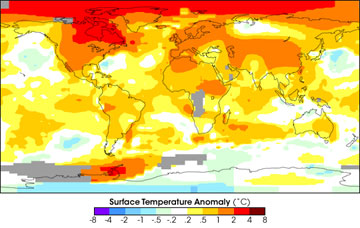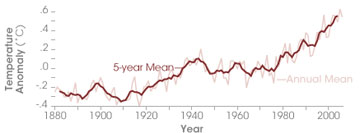2006 was fifth warmest year on record
2006 was fifth warmest year on record
mongabay.com
February 13, 2007
Last week NASA scientists announced that 2006 was the fifth-warmest year in the past century, after 2005, 1998, 2002, and 2003 (in descending order by warmest year).
According to Dr. James Hansen, Director of NASA’s Goddard Institute for Space Studies, “2007 is likely to see warmer temperatures than 2006 and could prove to be the warmest on record, thanks to an El Niño and continued emissions of greenhouse gases.” Atmospheric levels of carbon dioxide are currently at their highest levels in at least 650,000 years.
Accompanying the announcement, NASA’s Goddard Institute for Space Studies, released a global map showing temperature anomalies during 2006, blue being the coolest and red being the warmest. NASA also published a graph that tracks mean global temperatures compared to the 1951 to 1980 mean. The graph shows a steady increase in temperatures since the late 1970s.

Courtesy of NASA’s Goddard Institute for Space Studies |
NASA’s announcement follows the release of the Intergovernmental Panel on Climate Change’s (IPCC) latest assessment of climate change. In it, the IPCC reports that a consensus of scientists say they are 90 percent confident that global warming is due to human activities.
Related articles
Global warming report released in Paris. The Intergovernmental Panel on Climate Change (IPCC) officially unveiled its long-waited report on global climate change. The report was produced by some 600 authors from 40 countries and representatives from 113 governments reviewed and signed off on the report the course of this week.
2006 is third warmest year on record for the United States. 2006 will likely go down as the third warmest year on record for the United States according to scientists at NOAA’s National Climatic Data Center (NCDC) in Asheville, North Carolina. Globally, 2006 will have the sixth highest annual global temperature since record keeping began in 1880 NCDC says that the 2006 annual average temperature for the contiguous United States (based on preliminary data) will likely be 2F (1.1C) above the 20th century mean, making 2006 the third warmest year on record, just cooler than 1998 and 1934. 2006 has been a record year for wildfires which researchers say will continue to increase in frequency and intensity as climate continues to warm.
2006 is sixth warmest year, but hurricanes below average. 2006 will be the sixth-warmest year on record according to the World Meteorological Organization (WHO). The United Nations weather agency said the ten hottest years have all occurred in the past 12 years. 2005 was the warmest year since record keeping began 150 years ago, according to the agency.
Carbon dioxide level highest in 650,000 years. Carbon dioxide levels are now 27 percent higher than at any point in the last 650,000 years, according to research into Antarctic ice cores published on Thursday in Science. Analysis of carbon dioxide in the ancient Antarctic ice showed that at no point in the past 650,000 years did levels approach today’s carbon dioxide concentrations of around 380 parts per million (ppm). The Intergovernmental Panel on Climate Change (IPCC) projects that atmospheric carbon dioxide levels could reach 450-550 ppm by 2050, possibly resulting in higher temperatures and rising sea levels (see “Ocean levels rising twice as fast”). There is fear that climate change could create a class of environmental refugees displaced from their homes by rising oceans, increasingly catastrophic weather, and expanding deserts.
This article uses quotes and information from a NASA news release.















